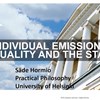budgets
Lukas H. Meyer: Fairness is most relevant for country shares of the remaining carbon budget
Lukas H. Meyer, Professor of Philosophy at the University of Graz, Austria, and Speaker of the Field of Excellence Climate Change Graz, the Doctoral Programme Climate Change, and the Working Unit MoraIn my talk I argue that fairness concerns are decisive for eventual cumulative emission allocations shown in terms of quantified national shares.I will show that major fairness concerns are quantitatively critical for the allocation of the global carbon budget across countries. The budget is limited by the aim of staying well below 2°C. Minimal fairness requirements include securing basic needs, attributing historical responsibility for past emissions, accounting for benefits from past emissions, and not exceeding countries’ societally feasible emission reduction rate. The argument in favor of taking into account these fairness concerns reflects a critique of both simple equality and staged approaches, the former demanding the equal-per-capita distribution from now on, the latter preserving the inequality of the status-quo levels of emissions for the transformation period. I argue that the overall most plausible approach is a four-fold qualified version of the equal-per-capita view that incorporates the legitimate reasons for grandfathering.

Per Molander: Public vs. private healthcare in the OECD area – a broad evaluation of performance
Healthcare systems can be categorised along the public/private axis into two main types: publicly administered systems and systems based on compulsory health insurance provided by the private sector.
“There is total silence here”. Ethical competence and inter-organizational learning in healthcare governance
Journal of Health Organisation and Management. DOI:10.1108/JHOM-05-2019-0130 AbstractThe purpose of this paper is to analyse ethical competence related to healthcare governance and management tasks at t
Per Molander: Public versus private healthcare systems in the OECD area – a broad evaluation of performance
Venue: Institute for Futures Studies, Holländargatan 13 in Stockholm or online Research seminar with Per Molander, PhD in control engineering and Bachelor's in mathematics, literature, etc. Throughout h

Julia Adler
I am a research assistant at the Mimir Center for Longterm Futures Research. In my role as research assistant I support the research group with planning, administration and implementation of the projec I am also writing my master's thesis in political science at Stockholm University as part of this project. I also support the communications department.

Säde Hormio: Individual emissions, equality and the state
Seminar with Säde Hormio, researcher in Practical Philosophy at the University of Helsinki. ABSTRACT The amount of greenhouse gases that can still be emitted to the atmosphere is very limited if global
Completed: Agenta
Ageing Europe: An application of National Transfer Accounts (NTA) for explaining and projecting trends in public finances (AGENTA). The AGENTA project aims at explaining the past and forecasting the fu
Subsistence Emissions and Climate Justice
British Journal of Political Science Abstract The climate justice literature typically endorses a moral right to produce subsistence emissions, but this right appears problematic considering how urgent
Säde Hormio: Individual emissions, equality and the state
Seminar with Säde Hormio, researcher in Practical Philosophy and Marie Skłodowska-Curie Fellow at the University of Helsinki. REGISTER Abstract The amount of greenhouse gases that can still be emitted to








